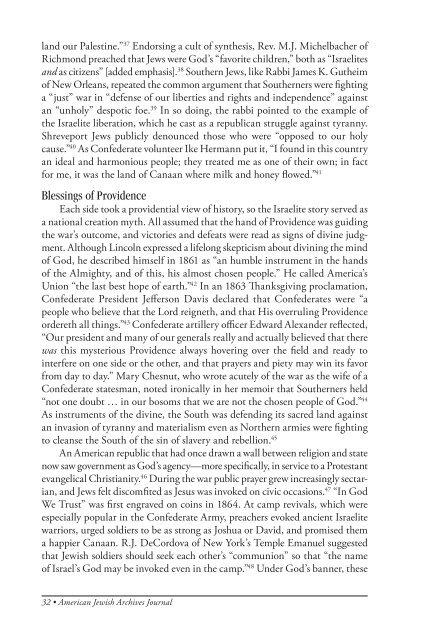American Jewish Archives Journal, Volume 64, Numbers 1 & 2
American Jewish Archives Journal, Volume 64, Numbers 1 & 2
American Jewish Archives Journal, Volume 64, Numbers 1 & 2
You also want an ePaper? Increase the reach of your titles
YUMPU automatically turns print PDFs into web optimized ePapers that Google loves.
land our Palestine.” 37 Endorsing a cult of synthesis, Rev. M.J. Michelbacher of<br />
Richmond preached that Jews were God’s “favorite children,” both as “Israelites<br />
and as citizens” [added emphasis]. 38 Southern Jews, like Rabbi James K. Gutheim<br />
of New Orleans, repeated the common argument that Southerners were fighting<br />
a “just” war in “defense of our liberties and rights and independence” against<br />
an “unholy” despotic foe. 39 In so doing, the rabbi pointed to the example of<br />
the Israelite liberation, which he cast as a republican struggle against tyranny.<br />
Shreveport Jews publicly denounced those who were “opposed to our holy<br />
cause.” 40 As Confederate volunteer Ike Hermann put it, “I found in this country<br />
an ideal and harmonious people; they treated me as one of their own; in fact<br />
for me, it was the land of Canaan where milk and honey flowed.” 41<br />
Blessings of Providence<br />
Each side took a providential view of history, so the Israelite story served as<br />
a national creation myth. All assumed that the hand of Providence was guiding<br />
the war’s outcome, and victories and defeats were read as signs of divine judgment.<br />
Although Lincoln expressed a lifelong skepticism about divining the mind<br />
of God, he described himself in 1861 as “an humble instrument in the hands<br />
of the Almighty, and of this, his almost chosen people.” He called America’s<br />
Union “the last best hope of earth.” 42 In an 1863 Thanksgiving proclamation,<br />
Confederate President Jefferson Davis declared that Confederates were “a<br />
people who believe that the Lord reigneth, and that His overruling Providence<br />
ordereth all things.” 43 Confederate artillery officer Edward Alexander reflected,<br />
“Our president and many of our generals really and actually believed that there<br />
was this mysterious Providence always hovering over the field and ready to<br />
interfere on one side or the other, and that prayers and piety may win its favor<br />
from day to day.” Mary Chesnut, who wrote acutely of the war as the wife of a<br />
Confederate statesman, noted ironically in her memoir that Southerners held<br />
“not one doubt … in our bosoms that we are not the chosen people of God.” 44<br />
As instruments of the divine, the South was defending its sacred land against<br />
an invasion of tyranny and materialism even as Northern armies were fighting<br />
to cleanse the South of the sin of slavery and rebellion. 45<br />
An <strong>American</strong> republic that had once drawn a wall between religion and state<br />
now saw government as God’s agency—more specifically, in service to a Protestant<br />
evangelical Christianity. 46 During the war public prayer grew increasingly sectarian,<br />
and Jews felt discomfited as Jesus was invoked on civic occasions. 47 “In God<br />
We Trust” was first engraved on coins in 18<strong>64</strong>. At camp revivals, which were<br />
especially popular in the Confederate Army, preachers evoked ancient Israelite<br />
warriors, urged soldiers to be as strong as Joshua or David, and promised them<br />
a happier Canaan. R.J. DeCordova of New York’s Temple Emanuel suggested<br />
that <strong>Jewish</strong> soldiers should seek each other’s “communion” so that “the name<br />
of Israel’s God may be invoked even in the camp.” 48 Under God’s banner, these<br />
32 • <strong>American</strong> <strong>Jewish</strong> <strong>Archives</strong> <strong>Journal</strong>
















